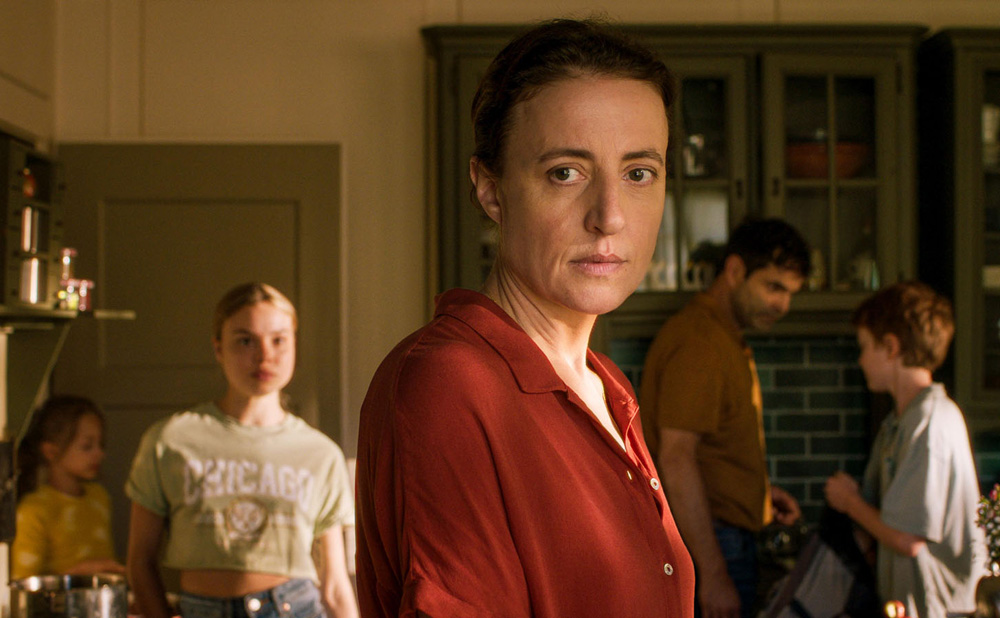There’s more blood splattered in “The Sparrow in the Chimney” than in either of Ramon and Silvan Zürcher’s previous features “The Strange Little Cat” and “The Girl and the Spider,” which isn’t to say they haven’t cut deep, only that the fraternal filmmakers from Switzerland have had a habit of keeping things tidy, often constraining themselves to a limited amount of locations where the messiness of life can be seen inside as characters try to keep a lid on it.
No such luck is afforded to Karen (Maren Eggert), the weary housewife who appears she’d rather be anywhere else than preparing a birthday celebration for her husband Markus (Andreas Döhler) – in fact, it is their prepubescent son Leon (Ilia Bultmann), who has taken the liberty of taking care of all the cooking from handling the roast to cutting up apples into swans. She isn’t too thrilled about welcoming any guests, including her sister Jule (Britta Hammelstein) and her husband Konrad (Milian Zerzawy) and their family, but her own immediate clan has her even more on edge. Her eldest daughter Christina seems like she can’t be blamed for taking the scenic route home from college while the teenage Johanna (Lea Zoë Voss) makes her contempt known to everyone around her after a devastating leg injury derailed a once promising dance career, though a path towards comedy could be in the cards with the bleak sense of humor she’s developed. Meanwhile, Leon’s in the kitchen when going to school means encountering a pack of vicious bullies. Yet in spite of all of this, you aren’t fully aware of why Karen doesn’t feel like the main character in her own life until Markus actually walks through the door, their estrangement palpable though the reason why is left conspicuously open.
Although Karen often occupies the center of the frame, the Zürchers don’t ever suggest she owns it with a larger presence looming in the house as Jule begins to express her discomfort with being back in their mother’s home where Karen moved her family after caring for her, and the filmmakers’ gift for tucking a strong plot into casual conversation has never been more potent when the bad memories that Jule brings up about their own parents appear to be playing out in real time with Karen stuck in a loveless marriage, leading her kids to resent her when she has disconnected from them as well. It may be the most self-conscious line of dialogue in any of the Zürchers’ work when Johanna mentions at one point, “A house needs to breath and the door is the mouth,” after leaving it unlocked for the guests to come in and while the directors have always believed that locations have as much of a pulse as anyone inhabiting them does, “The Sparrow in the Chimney” becomes an entirely new and exhilarating take on the haunted house when the ripples of its history are reflected in everyone’s discontent.
As day turns to night, the film becomes a little darker than even nature will allow for. Animal lovers should be warned that some furry creatures befall cruel fates when Karen’s thoughts become particularly grim. (With a neighbor that slaughters chickens and lets the corpse fly in the air for entertainment after its head has come off, Johanna jokes, “ That’s how angels look around here.”) Eggert, an actor of remarkable stoicism who could help ground the surrealistic flourishes of Maria Schrader’s “I’m Your Man” and Hanna Slak’s “Not a Word,” does similar heavy lifting here and as Karen’s mind starts to wander to more fantastical realms, her place in the house is gradually assumed by Liv (Luise Heyer), a neighbor who holds an enigmatic space in the film when connected to the family as an observer (and possibly more), but operating at a remove when she has never resided within the walls of the house.
The Zürchers’ playful formal touches blur the lines wherever they can, leading to some truly diseased imagery you can’t know if it’s real or not when mundane activities become scenes of horror as a life of routine has become for Karen, and blending diegetic music with more traditional cues from Balz Bachmann’s increasingly robust score becomes part of the pleasing sense of disorientation that makes Karen’s experience all the more deeply felt. Filled with a sense of dread that won’t be uncommon to some in how they approach their own family reunions, “The Sparrow in the Chimney” offers the same sense of relief when it’s all over, not only because of the wrenching drama it depicts, but the fresh air of its singular storytelling.
“The Sparrow in the Chimney” does not yet have U.S. distribution.




